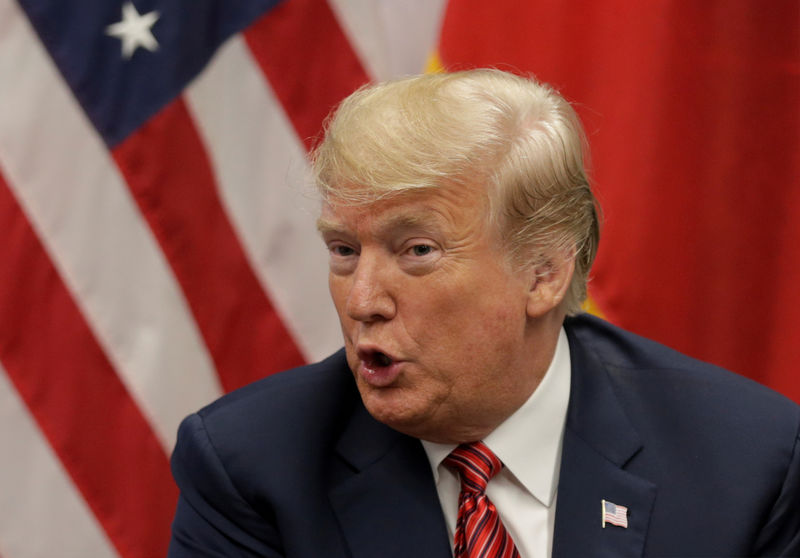By David Lawder and Lisa Lambert
WASHINGTON (Reuters) - U.S. President Donald Trump on Friday sounded an optimistic note about trade negotiations with China as two of his top economic advisers downplayed friction from the arrest of a senior executive of Chinese telecom equipment maker Huawei Technologies.
"China talks are going very well," Trump said on Twitter, without providing any details.
Major companies have expressed concerns about how the arrest of Huawei Chief Financial Officer Meng Wanzhou in Canada at the request of U.S. authorities would affect U.S.-China relations or that it would cause a potential backlash against American firms operating in China.
Meng, 46, the daughter of Huawei's founder, appeared in a Vancouver court for a bail hearing as she awaits possible extradition to the United States in the investigation of whether Huawei violated U.S. sanctions against Iran.
Larry Kudlow, director of the White House's National Economic Council, told CNBC he did not believe Meng's arrest would "spill over" into the talks with China aimed at increasing Beijing's purchases of U.S. farm and energy commodities, lowering Chinese tariffs and making sweeping changes to China's policies on intellectual property and technology transfers.
Kudlow said the investigation of whether Huawei violated U.S. sanctions against Iran was on a "separate track" from the trade talks and was a matter of national security and U.S. law.
"You can’t break the law. You break the American law, you break the Canadian law, you’ve got to pay the consequences of that," Kudlow said of the Huawei case. "That was the case with other companies, and will continue to be the case. These are issues of national security."
Continued concerns over U.S.-China trade relations caused stocks to sell off on Friday, with technology shares leading the decline. The Nasdaq Composite fell 2.4 percent, with the Dow Jones Industrial Average falling 2.1 percent and the S&P 500 index down 1.9 percent in afternoon trade.
White House trade adviser Peter Navarro told CNN that the U.S.-China trade talks and the Huawei arrest "are two separate events," calling the timing of Meng's arrest a coincidence.
Navarro said the arrest was the result of "the bad actions of Huawei," adding there was a "frightening" risk that the Chinese government could use the company's products for spying.
"The timing was unusual, but the actions were legitimate."
Asked if the United States would walk away from trade talks if U.S.-China differences were not resolved in 90 days, Navaro said: "It's not a question of walking away. It's a question of moving forward on the strategy, which is to simply raise the tariffs" on Chinese goods.
Kudlow expressed optimism that the United States and China will make substantial progress during the 90-day period allocated for talks, ending around March 1.
"I think there will be a lot of success in the next 90 days; President has indicated, that if there’s good solid movement and there’s good action, he might - he might - be willing to extend the 90 days," Kudlow told CNBC.
He reiterated that the Trump administration was expecting immediate movement from China on purchases of agricultural commodities and energy and added that he expected Chinese autos tariffs to be reduced. He said it was a positive sign that China was willing to discuss core issues related to intellectual property theft, forced technology transfers and computer hacking of U.S. companies.

However, Kudlow said U.S. Trade Representative Robert Lighthizer, who will lead the American side in the talks, will be looking to ensure that any agreements can be fully enforced and monitored to ensure follow-through by Beijing.